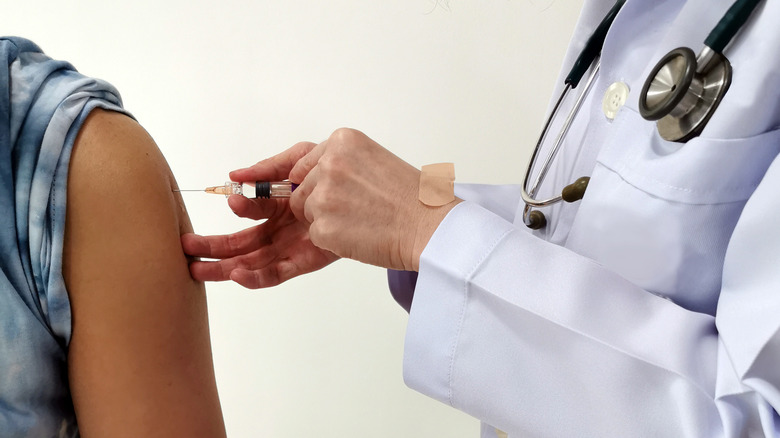What Are The Most Common Side Effects Of The Shingles Vaccine?
Shingles is a type of rash caused by a varicella-zoster viral infection, according to Mayo Clinic. It's the same virus that causes chickenpox and results in a very similar reaction by producing painful blisters on one side of the body.
Although not deadly, shingles causes significant pain and a burning sensation and might lead to fever and fatigue in some people. A small percentage of those infected develop a complication known as postherpetic neuralgia (PHN), where the pain of shingles continues even after the rash clears.
The only protection against shingles is to get vaccinated. According to the Centers for Disease Control and Prevention (CDC), vaccination is about 90% effective against not only shingles but also PHN, especially in adults 50 years and older. The vaccine is currently only recommended for people over 50 or those with a weakened immune system who are at least 19 years old. People with a known allergy to the vaccine, who currently have shingles, or pregnant women should not get the vaccine — always talk to your doctor if you fall into one of those categories.
There's currently only one available vaccine against shingles in the U.S. The single-dose Zostavax vaccine was discontinued in the U.S. in 2020 and the newer two-dose Shingrix is now the only option available to protect against shingles.
What to expect after getting vaccinated
The vaccine is likely to produce some side effects, though these can be milder or stronger depending on the individual receiving the vaccine. They might also be confined to just one of the doses or appear each time you get the vaccine. Either way, symptoms usually last 2–3 days and can easily be treated with over-the-counter painkillers (such as ibuprofen) if necessary (via CDC).
Redness, swelling, and pain often appear on the injection site, and the CDC warns that people might also experience muscle aches, fever, headaches, nausea, stomach pain, and a general feeling of tiredness. Side effects are expected and you shouldn't skip the second dose just because you experienced mild symptoms after the first one.
Although severe allergic reactions aren't common, they can cause serious problems that require quick medical attention. Symptoms of severe allergic reactions include hives, difficulty breathing, swelling of the face, and a fast heartbeat, according to the official Shingrix website.
Shingrix also increases the risk of developing Guillain-Barré syndrome. Although rare, the FDA requires an official warning regarding the potential for Shingrix to cause Guillain-Barré, a poorly understood condition in which the immune system attacks nerve cells, causing severe muscle weakness and sometimes paralysis.


